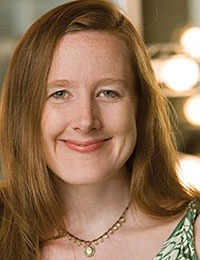
Thus opens Sarah Ruhl’s provocative In the Next Room (or The Vibrator Play) (2010). In April, WUSTL’s Performing Arts Department (PAD) in Arts & Sciences will produce the critically acclaimed comedy as its spring Mainstage production.
But Wednesday, April 3, Ruhl herself will deliver the PAD’s annual Helen Clanton Morrin Lecture. The free talk, co-presented by the Women, Gender and Sexuality Studies Program in Arts & Sciences, is titled “Micro-essays for the Theatre” and will begin at noon in Edison Theatre.
In addition, the PAD and the George Warren Brown School of Social Work will host “What’s Happening In the Next Room?” a symposium about Ruhl’s play, at 4:15 p.m. Thursday, April 4, in Brown Hall Lounge.
For more information about either event, call (314) 935-5858 or visit pad.artsci.wustl.edu/events.
Performances of In the Next Room run April 19-28 in Edison Theatre. For tickets, call (314) 935-6543.
A serious message, playfully delivered
The winner of a 2006 MacArthur Foundation “Genius Award,” Ruhl has been praised by The New York Times’ drama critic Charles Isherwood as “one of the most gifted and adventurous American playwrights to emerge in recent years.”
In the Next Room, which was nominated for three Tony Awards and a Pulitzer Prize, deploys historical fact to examine issues that remain contentious — namely, the ways in which custom and patriarchy combine to keep both sexes ignorant about female sexuality.
“Sarah Ruhl is arguably the most gifted under-40 playwright in America today,” says Henry I. Schvey, PhD, professor of drama and director of the upcoming production. “Her work is poetic without being unnecessarily abstract, serious without being maudlin, and difficult without being arcane. The darkness in her plays is leavened with lyricism and humor, and her language is powered by strong, unforgettable theatrical images.
“In the Next Room is a deep and challenging script on many levels,” Schvey continues. “Set in an upper-middle-class home in 1880s America, it explores sexual difference and power relations as well as the changes wrought by Mr. Edison’s invention of the lightbulb. The Victorian setting is fully realized, but also an apt metaphor for the way in which our own lives remain controlled by technology and scientific progress.
“At the same time, In the Next Room is a comedy,” Schvey emphasizes. “Its characters are drawn with compassion, cleverness and wit.
“At the heart of this work, there is an unquenchable sense of the beautiful mystery of life. Ruhl’s subject is not only conflict and power, but also how we love.”
Sarah Ruhl
Ruhl earned a bachelor’s degree in English and a master’s degree in playwrighting from Brown University. Her plays, which have been produced nationally and have been translated and performed internationally, include Stage Kiss; The Clean House; Passion Play; Dead Man’s Cell Phone; Melancholy Play; Eurydice; Orlando; and Late: A Cowboy Song.
Her most recent work, Dear Elizabeth, is based on the 30-year correspondence between poets Elizabeth Bishop and Robert Lowell.
Ruhl’s growing list of industry awards include the PEN American Award, the Fourth Freedom Forum Playwriting Award and the Whiting Writers’ Award. Recently, she received the PEN/Laura Pels International Foundation for Theater Award for a distinguished American playwright in mid-career.